On October 15, the State Council conducted its 16th thematic study session focusing on “Strengthening the Leading and Safeguarding Role of Standards, Promoting High-Quality Economic Development Through Standard Upgrades.” During the session, it was emphasized that there should be thorough study and implementation of important directives and relevant decisions from the central leadership, accelerating reforms and innovations in standardization work, improving the quality and upgrading of the real economy, and continuously enhancing the internal drivers for high-quality development.
The study session featured explanations on standardization topics, followed by exchange discussions.
It was noted that standards serve as fundamental institutional frameworks that play a crucial role in building a modern industrial system and establishing a unified national market. In recent years, significant progress has been made in standardization work, with expanding coverage and continuously improving standards. However, some weaknesses still exist. Standard upgrades should be prioritized, accelerating the development of a standards system that meets the requirements of high-quality development, and better leveraging the leading and safeguarding role of standards.
It was emphasized that standard supply should be optimized, closely aligned with actual economic and social development needs, addressing urgent requirements first while making orderly improvements. Standard needs should be systematically reviewed industry by industry, strengthening empowerment through digital technologies like artificial intelligence, and systematically advancing standard formulation and revision.
Standard implementation should be strengthened through both strict supervision and optimized services, utilizing inspection, testing, certification, and accreditation to promote standard implementation. A responsibility list for mandatory standard implementation should be established, with emphasis on referencing recommended standards in industrial policies, government procurement, and bidding processes, guiding enterprises to implement high-level standards.
International standardization levels should be enhanced through deepened international cooperation and exchanges in standardization, steadily expanding institutional openness in standards.
It was pointed out that reform and innovation should serve as the driving force, continuously improving the institutional mechanisms for standardization work, and comprehensively enhancing overall standard levels and standardization management efficiency.
The relationship between government and market should be properly handled, with government departments playing their role in top-level design and normative guidance, while supporting market forces including enterprises and industry alliances to play a greater role in standard development, and promoting the healthy development of enterprise standards and association standards.
The relationship between national-level standards and local standards should be properly managed, further clarifying the positioning of standards at different levels, streamlining standard hierarchies, accelerating the removal of standard barriers that hinder the construction of a unified national market, and effectively forming a positive pattern of unified national rules supplemented by local characteristics.
The relationship between standard management and industry governance should be properly handled, improving working mechanisms that feature coordinated organization, division of responsibilities, and collaborative cooperation, promoting the formation of synergistic forces for standardization work reform.



